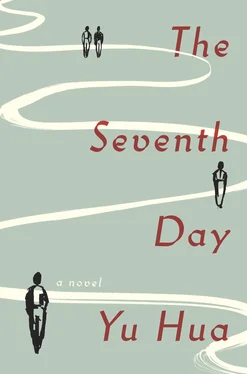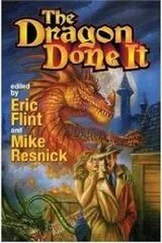Swaying awkwardly on the debris, I made my way over to where she was. When she raised her head, I saw a face scoured red by the wind.
“Aren’t you cold?” I asked.
“Yes, I am,” she replied.
I pointed at the KFC nearby. “It’ll be warm inside,” I said. “Why not do your homework there?”
She shook her head. “My mom and dad wouldn’t be able to find me when they come back.”
She lowered her head again and went back to doing her homework on the table she had made with her legs. I scanned the ruins.
“Do you know where Zheng Xiaomin lives?” I asked her.
“Right here.” She pointed at where she was sitting. “I am Zheng Xiaomin.”
Seeing her surprise at my knowing her name, I told her I was the man engaged to tutor her. She nodded to indicate that she knew of the arrangement, but looked around blankly. “Mom and Dad aren’t home yet.”
“I’ll come back tomorrow,” I said.
“We won’t be here tomorrow,” she said. “Call my dad,” she suggested, “he’ll know where we’ll be tomorrow.”
“All right,” I said, “I’ll call him.”
As I clambered back over the rubble, I heard her voice behind me. “Thanks, teacher.”
It was the first time I’d been called “teacher.” I looked back at the girl in the red down jacket. Sitting there, she softened the ruins.
I walked back to the city square, where now there were gathered two or three thousand people holding banners and shouting slogans — this time it looked as though they really were demonstrating. The perimeter of the square was filled with policemen and police cars, and the police had closed the roads and were preventing others from entering the square. I saw a demonstrator standing on the steps in front of the city government headquarters. He was holding a megaphone and shouting over and over again at the restive crowd: “Keep calm! Please keep calm!”
With the repetition of this message, the demonstrators gradually calmed down. Holding the megaphone in one hand and gesticulating with the other, the man began to address the crowd. “We are here to demand equity and justice. Our demonstration is peaceful. We mustn’t do anything extreme, we mustn’t give them a pretext to discredit us.”
He paused. “I have to inform you all,” he continued, “that in the demolitions conducted this morning at Amity Street, a married couple were buried under the rubble and it’s not clear if they are alive or dead….”
A van stopped next to me and seven or eight men jumped out of it, their pockets bulging. They went up to the police who were blocking the roads, waved ID in their faces, and then proceeded directly in through the cordon, first with a swaggering confidence, then at a rapid trot. They ran onto the steps in front of the government offices and began to yell, “Smash the city government!”
They pulled stones out of their pockets and threw them at the windows and doors of the city government headquarters; I heard the sound of breaking glass. Police now poured into the square from all directions and began to disperse the crowd; chaos ensued as the demonstrators fled in all directions. Those who tried to resist were soon pinned to the ground. The group of men who had broken the windows came trotting back, nodded to the two policemen standing in front of me, and hopped into the van, which immediately sped off. It had no license plates, I noticed.
That evening I went to a restaurant called Tan Family Eatery. It served tasty food at a reasonable price, and I had become a regular customer, though all I ever ordered was a bowl of noodles. I tried calling Zheng Xiaomin’s father several times from the phone next to the cash register, but nobody ever picked up and all I heard was a monotonous ringtone.
On TV they were covering the afternoon’s demonstration. The report claimed that a small group of troublemakers had created a disturbance in the square in front of the city government headquarters, misleading those ignorant of the truth and causing damage to public property. The police had detained nineteen suspects and the situation had now been stabilized. The TV did not broadcast any video footage and all we saw were the two news anchors, a man and a woman, reporting this news. Then the media spokesman for the city government  —well-dressed, sitting on a sofa — appeared on the screen, taking questions from a network reporter. The reporter would ask a question and the spokesman would answer it, the two of them simply repeating the lines uttered just a few moments earlier by the news anchors. Then the reporter asked if a married couple had been buried in the rubble during the demolitions on Amity Street. The spokesman strenuously denied this, describing it as pure rumor and announcing that those responsible for fabricating it were now in custody. The spokesman finished up by cataloging the outstanding achievements of the city government in recent years and extolling the improvements to people’s standard of living.
—well-dressed, sitting on a sofa — appeared on the screen, taking questions from a network reporter. The reporter would ask a question and the spokesman would answer it, the two of them simply repeating the lines uttered just a few moments earlier by the news anchors. Then the reporter asked if a married couple had been buried in the rubble during the demolitions on Amity Street. The spokesman strenuously denied this, describing it as pure rumor and announcing that those responsible for fabricating it were now in custody. The spokesman finished up by cataloging the outstanding achievements of the city government in recent years and extolling the improvements to people’s standard of living.
“Waitress, change the channel!” a man drinking at the table next to me yelled.
A waitress picked up the remote and came over to change the channel. The news spokesman vanished and a soccer game now occupied the screen.
The man turned to me. “Did you hear what those jokers are saying? I don’t even believe their punctuation.”
I smiled thinly, then bent down again to eat my noodles. During my father’s illness, I had brought him here, supporting him by the arm. We sat at a corner table on the ground floor and I ordered his favorite dishes, but he couldn’t eat more than a few mouthfuls before throwing it all up. After cleaning up the mess on the table and floor, I had helped him home, saying to the proprietor as we left, “I’m sorry about that.”
He gently shook his head. “No worries. Look forward to seeing you next time.”
After my father’s disappearance, I would come here alone and sit in that same corner, dolefully eating my noodles. The proprietor would come over and sit opposite me and ask about my father’s situation, for he remembered us. On one occasion I broke down and told him my story, how my father had gone off by himself, so that he wouldn’t be a burden to me. The proprietor didn’t say anything, just looked at me with sympathy.
Later, every time I came here, the proprietor would treat me to a fruit plate at the end of my meal and join me for a chat.
His name was Tan Jiaxin. He and his wife and their daughter and son-in-law ran this restaurant together, with private rooms on the second floor and open seating on the first. They came from Guangdong and sometimes they would bemoan the fact that they had no family ties in this city and no network of connections, so life was hard. Seeing how there was a regular flow of customers and business seemed to be booming, I assumed he was making good money, but he always had a look of worry on his face. Once, he told me that people from public security, emergency services, sanitation, and the commerce and tax bureaus would regularly come and eat extravagant meals, but they refused to pay up front, insisting that everything be put on credit, with some private business or other clearing the debt at the end of the year. At the beginning it wasn’t so bad, he said, and seven or eight out of ten of the bills would be paid, but with the economy in poor shape these past few years, many companies had folded and fewer and fewer were coming to settle the accounts, but these government officials still kept coming to feast. So although the restaurant might seem to be doing well, he said, actually the Tans’ expenditures exceeded their income. Nobody dares to offend government people, he said.
By the time I finished my noodles, somebody had changed the channel and again there appeared coverage of the afternoon’s demonstration. A female reporter was interviewing some people in the street, who all expressed outrage at the reckless behavior of those who had vandalized the government headquarters. Then a professor appeared on the screen, a law professor at the university I had attended. He talked with a slick fluency, first condemning the violence that afternoon, then emphasizing how the people needed to trust and understand and support the government.
Читать дальше

 —well-dressed, sitting on a sofa — appeared on the screen, taking questions from a network reporter. The reporter would ask a question and the spokesman would answer it, the two of them simply repeating the lines uttered just a few moments earlier by the news anchors. Then the reporter asked if a married couple had been buried in the rubble during the demolitions on Amity Street. The spokesman strenuously denied this, describing it as pure rumor and announcing that those responsible for fabricating it were now in custody. The spokesman finished up by cataloging the outstanding achievements of the city government in recent years and extolling the improvements to people’s standard of living.
—well-dressed, sitting on a sofa — appeared on the screen, taking questions from a network reporter. The reporter would ask a question and the spokesman would answer it, the two of them simply repeating the lines uttered just a few moments earlier by the news anchors. Then the reporter asked if a married couple had been buried in the rubble during the demolitions on Amity Street. The spokesman strenuously denied this, describing it as pure rumor and announcing that those responsible for fabricating it were now in custody. The spokesman finished up by cataloging the outstanding achievements of the city government in recent years and extolling the improvements to people’s standard of living.









